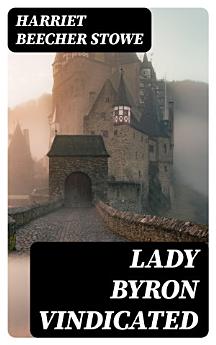Lady Byron Vindicated: A history of the Byron controversy from its beginning in 1816 to the present time
Sep 2022 · DigiCat
Ebook
247
Pages
family_home
Eligible
info
reportRatings and reviews aren’t verified Learn More
About this ebook
In "Lady Byron Vindicated," Harriet Beecher Stowe crafts a compelling narrative that fiercely defends Lady Byron against the allegations of her character by her estranged husband, Lord Byron. Through a combination of thorough research, personal letters, and emotive prose, Stowe not only reconstructs the tumultuous relationship between the Byronic couple but situates it within the broader contexts of gender, honor, and societal expectation in the 19th century. Her literary style embodies the sentimentalism prevalent in her era while also incorporating elements of feminist thought, making it a powerful critique of the patriarchal structures that shape women's lives. Harriet Beecher Stowe, renowned for her groundbreaking novel "Uncle Tom's Cabin," was a prominent abolitionist and advocate for women's rights. Her own experiences with the injustices faced by women and marginalized individuals inform her portrayal of Lady Byron as a victim of circumstance and societal scorn. Stowe's exploration of personal integrity versus public perception reflects her commitment to social reform and her belief in the moral imperatives of justice and truth. This book is a must-read for scholars and enthusiasts of feminist literature and historical biographies. Stowe's meticulous examination of Lady Byron's life not only reclaims her from the shadows of history but also resonates with contemporary discussions on women's rights and social equity. Readers will find themselves challenged and inspired by this eloquent plea for justice.
About the author
Harriet Beecher Stowe (1811–1896) was an American abolitionist and author, celebrated for her enduring novel 'Uncle Tom's Cabin' (1852). Stowe was born in Litchfield, Connecticut, into an influential family that valued education and social reform. Her father, Lyman Beecher, was a prominent Congregationalist minister, and her siblings, including Henry Ward Beecher, were also active in the religious and social movements of their time. Her educational undertakings at the Hartford Female Seminary laid the groundwork for her literary pursuits and reformist zeal. Stowe's profound impact on the American anti-slavery movement was largely attributed to the widespread influence of her novels, most notably 'Uncle Tom's Cabin,' which illuminated the cruelties of slavery and humanized its victims. The book became a bestseller in its time and a driving force behind the anti-slavery movement's growing momentum. Stowe continued to address social issues in her later works, notably in 'Lady Byron Vindicated' (1869), a text that tackled the complex and often misunderstood narrative of Lady Byron's life. Her writings often reflect a blend of sentimentalism with a strong moral message, seeking to engage her readers' empathy and advocate for social justice. Stowe's legacy lives on through her considerable contributions to American literature and the abolitionist movement, situating her as a significant figure in the cultural history of the United States.
Rate this ebook
Tell us what you think.
Reading information
Smartphones and tablets
Install the Google Play Books app for Android and iPad/iPhone. It syncs automatically with your account and allows you to read online or offline wherever you are.
Laptops and computers
You can listen to audiobooks purchased on Google Play using your computer's web browser.
eReaders and other devices
To read on e-ink devices like Kobo eReaders, you'll need to download a file and transfer it to your device. Follow the detailed Help Center instructions to transfer the files to supported eReaders.






